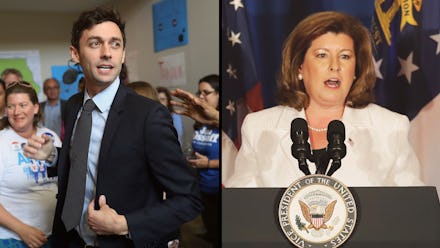Georgia's 6th heads to the polls on Tuesday for a special election. Here's what you need to know.

On Tuesday, voters in Georgia's 6th Congressional District will head to the polls to cast their votes in the most expensive race for the House of Representatives in U.S. history. Money and organizers from around the country have flooded the tiny Atlanta suburb for what's being considered a bellwether moment for the electoral resistance to Trump's presidency.
Here's what you need to know going into the election.
How we got here
Back in April, Georgia held a so-called "jungle primary," in which members of both parties competed to fill the seat vacated by Tom Price, President Donald Trump's Health and Human Services secretary. The rules stated that if no candidate received an outright majority, the top two vote-getters would continue on to a runoff at a later date.
Democrats rallied around Jon Ossoff, a 30-year-old filmmaker and former intern for congressman and civil rights icon John Lewis. Republican support was split among a broader field of candidates.
In the end, Ossoff came just short of an outright majority — 48% of the vote — but took the most votes of any candidate. Finishing second was Republican Karen Handel, a perennial Georgia candidate who is best known for having been forced out of a leadership role with cancer charity Susan G. Komen Foundation after she attempted to end the organization's support for Planned Parenthood.
Since the primary, Handel has attempted to tie Ossoff to the national Democratic Party and House Minority Leader Nancy Pelosi. Republican strategists often lean on the unpopularity of the national Democratic Party when running campaigns in districts that lean red.
Ossoff has tried to focus voters' attention on the unpopular Republican health care bill and Handel's controversial background at Komen.
At the one and only debate in the race, Handel made a major misstep when she told the audience that she does not "support a livable wage.” Ossoff also pressed Handel on her history with Komen, noting that she ran on her record trying to defund Planned Parenthood in a different race just a few years earlier.
Why it matters
Both Democrats and Republicans believe the outcome of this race will be an indicator of how much the Trump resistance will factor into the 2018 midterm elections.
Though the district leans Republican, Trump carried the district by less than two points in the 2016 election. And some Democratic strategists believe that the district's affluent and educated middle-class population is exactly the kind of voter base that could help them recapture the House in 2018. Democratic strategist Brian Fallon summed up this theory by saying that the path to a Democratic majority "runs through the Panera Breads of America."
Fallon's theory hasn't been without controversy. Some on the progressive left believe that courting affluent suburban voters instead of making a populist appeal to working-class people is precisely the reason that Hillary Clinton lost the 2016 election. But after progressive populist candidate Rob Quist lost the special election for Montana's at-large district, Ossoff has become the last best chance for Democrats to win a symbolic victory ahead of 2018.
So who's going to win?
Right now the polls are exceedingly close, but behind the scenes, Republicans are preparing for a potential loss. Public polls show Ossoff with a slim lead of 2 percentage points, but internal polling reportedly shows that lead could be as much as 5 points.
“If we’re losing upper-middle-class, suburban seats in the South to a 30-year-old progressive liberal, we would be foolish not to be deeply concerned about the possibility that would exist for a tidal wave election for Democrats in 2018,” Republican strategist Chip Lake told Politico.
But Democrats have even more riding on the victory. If Ossoff fails to win clinch the victory, it could signal that the grassroots opposition to Trump is not as strong as they had thought. It could also ad fuel to a debate between the progressive and establishment wings of the party about where the party should focus its energy.
Though the party remains divided, Democrats are united in their hope that Ossoff will win the race and pave the way for an electoral rebuke of the Trump agenda.